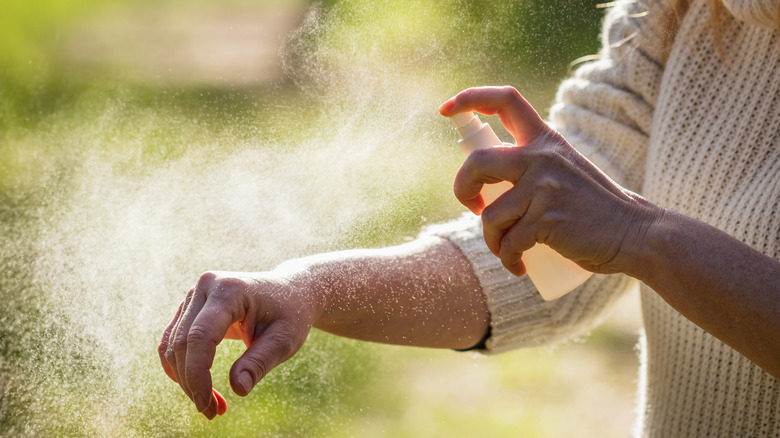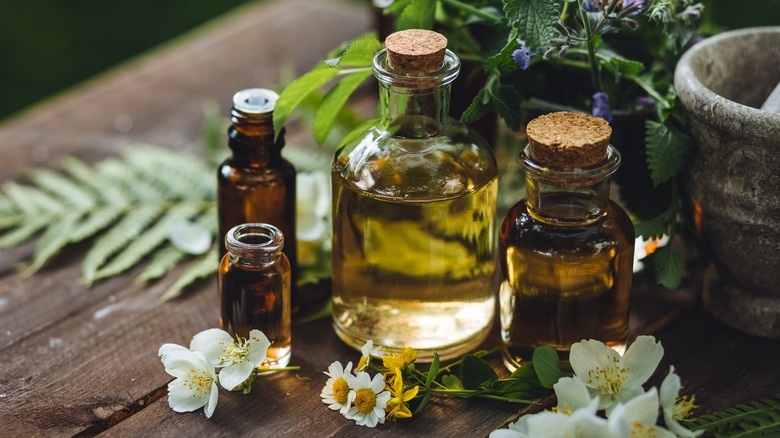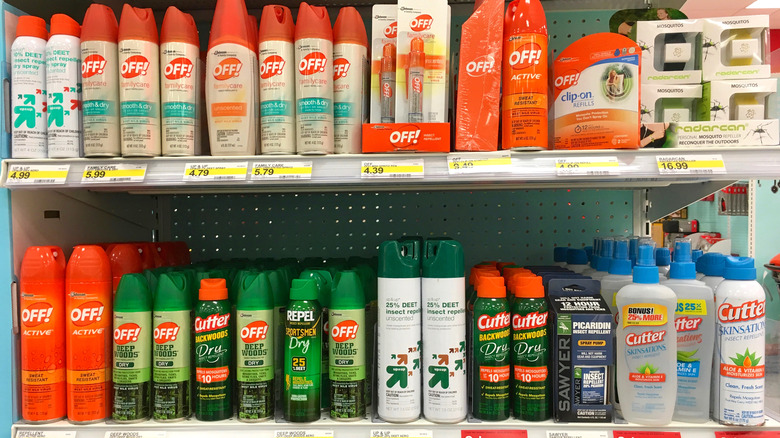DIY Mosquito Repellent Vs Store-Bought: The Best Solution For Your Pest Problem
To truly enjoy those days of warm weather throughout the year, you need to be sure that mosquitoes aren't bothering you and your family while in the backyard or out on your patio. Mosquitoes can turn any time spent outdoors into a much itchier and more frustrating experience, so it's well worth using a repellent of some kind to get rid of them. Making a homemade mosquito repellent is often recommended as a great solution these days, while others claim that store-bought mosquito repellents are a necessity.
Unfortunately, the truth of which repellent type works better isn't cut and dry. Both types of repellents have pros and cons that you should consider when deciding which to use. Generally speaking, both can be effective, but store-bought mosquito repellents are usually on the stronger side and their effects will last longer. Natural products may only last one to two hours, while commercial products often last for six or seven hours. On the other hand, DIY repellents with natural ingredients may be a bit safer and are good choice for small children around. However, everyone reacts differently to mosquito repellent ingredients, and both DEET and natural alternatives can potentially cause skin irritation.
The scoop on natural mosquito repellents
There are many different types of DIY repellent ingredients that can be used to deter mosquitoes. This includes essential oils, as well as other common household staples such as coffee grounds, vinegar, and even grapefruit.
The big drawback of many, but not all, of these natural ingredients, is that they haven't been studied as extensively for their mosquito repellent effects when compared to the chemicals and compounds in store-bought mosquito repellents. They also haven't been evaluated by the U.S. Environmental Protection Agency (EPA), unlike many store-bought repellents. While there are studies that demonstrate essential oils do a great job of repelling mosquitoes, many other natural ingredients are unverified in their effectiveness. Another drawback is that, although these ingredients may work, they don't tend to work for as long as store-bought mosquito repellents do, so you'll need to apply them more often.
If you're interested in trying natural mosquito repellents, consider using some of the household staples listed above. If using essential oils, focus on those that contain linalool or geraniol — these tend to work best for repelling mosquitoes. However, citronella can also keep mosquitos away as well. It also seems to be best to use these essential oils with an essential oil diffuser. One 2009 study showed that diffusers worked effectively and significantly better than candles at repelling mosquitoes.
How store-bought mosquito repellents compare
In comparison to natural and DIY mosquito repellents, store-bought mosquito repellents tend to have been researched more. Chemicals such as DEET in particular have been evaluated extensively by the EPA. They're well understood and verified as effective for repelling mosquitoes. Store-bought products tend to last for a long time and won't need to be sprayed or applied as often as many natural products will.
Despite this, they have their drawbacks. Ingredients in store bought products, such as DEET, can be toxic in rare cases, and will be unsafe if used incorrectly. Although it's easy to follow their instructions, store-bought products such as those with DEET can cause skin irritation and should be used carefully. You shouldn't use more than recommended, otherwise your potential to experience an adverse reaction becomes higher.
When choosing a store-bought mosquito repellent, it's highly recommended to choose products that contain DEET at a concentration of between 10 to 30 percent. DEET products are a great choice overall for strong and long-lasting protection. In addition to these, products with picaridin or lemon eucalyptus (OLE) are also worth considering if you're buying a store-bought mosquito repellent.


